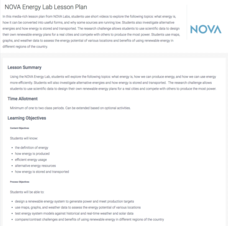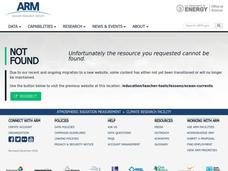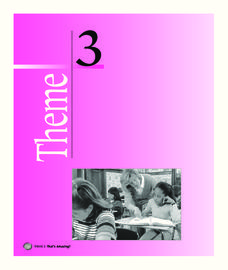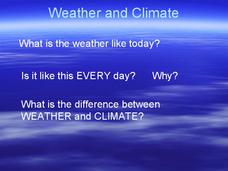NOAA
Boat Building Challenge
Scholars build a boat using an assortment of materials such as foam plates, aluminum foil, and skewers, then test its buoyancy with pennies. Challenge boat builders to construct the strongest or fastest boat in a healthy competition with...
PBS
NOVA Energy Lab Lesson Plan
Can our energy resources keep up with our ever-growing population? Science scholars learn the basics of energy and Earth's energy resources during an electrifying lesson. The resource combines video clips and an engineering design...
Climate Research Facility
Ocean Currents
Young scientists investigate the effects of heating a beaker of ice water by dropping dye into the water and observing how the color circulates.
Teach Engineering
Energy Systems
Is electricity created in the outlet? Using posters of several energy systems, collaborative groups identify and describe the parts of their systems. The groups also look at the environmental impacts of the systems and present their...
Society of Petroleum Engineers
Renewable and Nonrenewable Energy
Energize an environmental science unit on natural resources with this collection of instructional materials. From simple coloring sheets for primary grade children, to guiding questions for a high school research report, a wide variety...
Tennessee Valley Authority
Renewable Energy Sources
Not all energy sources are renewable, as learners investigate in this unit. Made up of six lessons that span a few weeks of instruction, the unit has learners examining US energy reserves and consumption, using data to draw conclusions...
Practical Action
Moja Island
Did you know that 1.3 billion people live without any form of electricity? Discover an array of possible renewable energy options by taking a trip to Moja Island, an online learning resource that will equip you and your learners with an...
National Energy Education Development Project
Great Energy Debate
If someone yelled for eight years and eight months, they could produce enough energy to heat one cup of coffee. A lesson plan on energy encourages scholars to research 10 different energy sources in groups before playing a game. Twenty...
PHET
Mapping the Field of Multiple Dipole Magnets
So you built a magnetometer, now what? High school scientists use their magnetometer made in a previous lesson plan to map the union of magnetic fields of dipole magnets. They experiment with different alignments and draw conclusions...
Houghton Mifflin Harcourt
That’s Amazing!: English Language Development Lessons (Theme 3)
That's Amazing! is the theme of an English language development unit created by Houghton Mifflin. Following a speak, look, move, and listen routine, scholars delve into topics; seasons, weather, animals, landforms, telling time,...
Curated OER
Weather and Climate
It's hot today, but is that the weather or the climate? This colorful presentation isolates both concepts to allow for better understanding by covering the positioning of the planet, making comparisons of land versus water, and looking...
NOAA
Ocean Waves
Surf's up! What causes the constant motion of Earth's oceans? Scholars discover the origins and types of waves in part nine of a 13-installment series. The resource illustrates wave behavior, their destructive power, and current research...
NOAA
Hurricanes
Here's a hurricane lesson that's sure to catch your eye! Pupils learn about the unique balance of conditions required to form one of nature's most destructive forces. The interactive illustrates how hurricanes form, grow, and affect...
NOAA
Tides
Sometimes low, sometimes high, but always in motion! Explore Earth's tidal system in the 10th interactive in a series of 13. Engaging life and earth science students alike, the versatile resource demonstrates cause and effect between...
NASA
Revising an Investigation
Write, edit, and then revise! The fourth lesson in a five-part series asks peers to provide feedback on research. Individuals then use the research to edit and revise conclusions and develop their presentations.
Magic of Physics
Loads Lab
Take a load off! Introduce junior engineers to the effects of load on structural design with an easy-to-use interactive. Individuals apply one of many load options, examine its effects, then learn about the safeguards employed during...
PBS
Rain Shadows
Satellite images from NASA help scholars focus on the similarities on the planet rather than the differences. The photos from the installment of a larger PBS series exploring weather and climate compare geological formations in the...
PBS
Regional Patterns of Climate: Pacific Northwest
Climate systems involve sunlight, ocean, atmosphere, ice, land forms, and many other factors. Scholars explore each of these variables related to the Pacific Northwest rain forest. They use an online interactive to investigate the polar...
College Board
2018 AP® Environmental Science Free-Response Questions
Less than nine percent of all AP Environmental Science test takers scored a perfect five on the exam in 2018. Learn from the best answers as well as the common mistakes thanks to the College Board. Four questions from the test covering...
NOAA
Understanding El Niño Using Data in the Classroom
Are weather troubles caused by El Nino? An installment of a larger series presents a five-part lesson on El Nino. First, scholars learn to read sea surface temperature maps. Then, they compare them to data on graphs before determining if...
Howard Hughes Medical Institute
Distribution of Elements in Earth’s Crust
How do scientists know the difference between a meteorite from space and a regular rock from the earth? Scholars read a passage and answer comprehension questions about the creation of the solar system. They extrapolate the main ideas to...
Pace University
Grades 9-10 Energy Sources
Alternative energy sources are becoming increasingly important. Learners have the opportunity to explore alternative energy sources using a differentiated instruction unit. They group together based on ability levels, assign roles to...
Utah Education Network (UEN)
Utah Open Textbook: 4th Grade Science
How does weather affect Earth? Learners understand the characteristics of water and make predictions about weather patterns. They recognize how water and weather affect rocks and minerals through erosion. They also learn about fossils...
American Chemical Society
Hosting a Chemistry Debate
A debate is a forum for discussing controversial topics and environmental chemistry definitely fits that category. The lesson provides everything necessary to run a mini debate tournament. Use the suggested topics or come up with some as...
Other popular searches
- Gone With the Wind
- Wind Erosion
- Windows Movie Maker
- Wind in the Willows
- Inherit the Wind
- Wind Energy
- Gilberto and the Wind
- Global Winds
- Window Jeannie Baker
- Hello Goodbye Window
- Wind Direction
- Wind Power

























